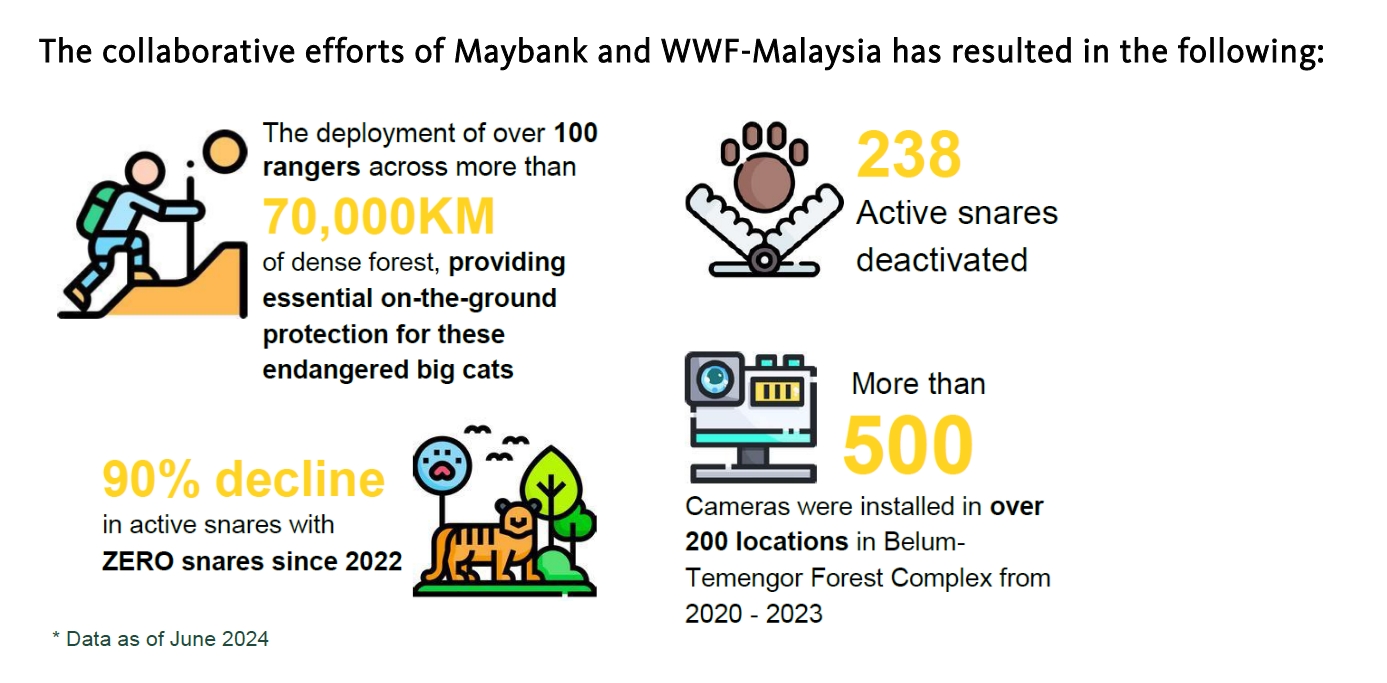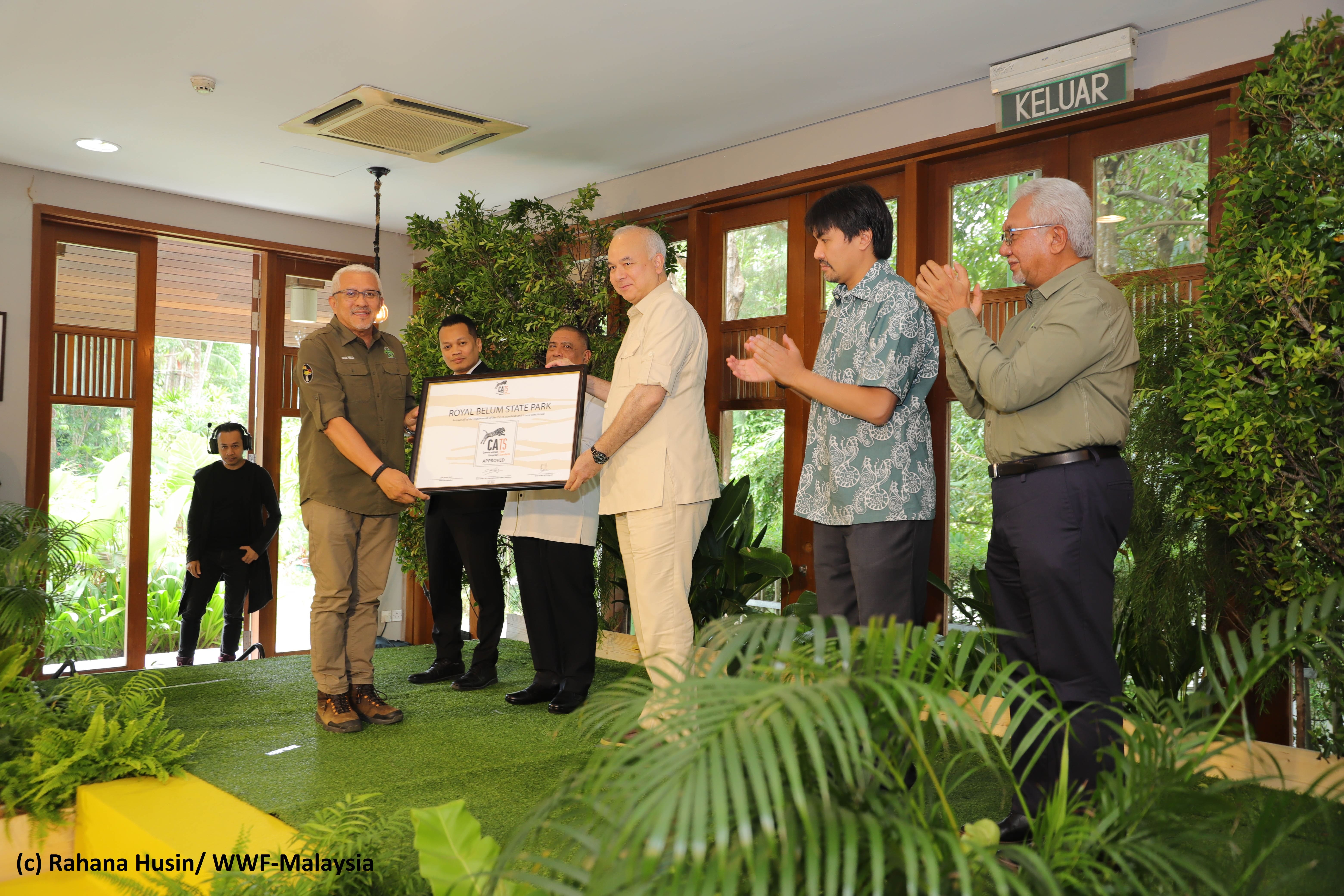Environmental Diversity
The population of the Malayan tiger, pictured in our logo, is dwindling. From 3,000 in the 1950s, the number of tigers in Malaysia is estimated to have declined to between 250 and 340. We are working with WWF-Malaysia, and relevant governmental and regulatory agencies to do our part in supporting the conservation of tigers. The conservation efforts include protection and monitoring of tigers as well as engagement with communities.

Strengthening Tiger Conservation in the Belum-Temengor Forest Complex
The Malayan tiger (Panthera tigris jacksoni) can only be found in Peninsular Malaysia and was recognised in 2004 as the 9th sub-species. In the 1950s, there was an estimated 3,000 Malayan tigers roaming in the forest, but as of today, less than 150 remaining tigers are believed to have survived. This number has not been confirmed for certain.
The number is steadily decreasing poaching, illegal trade of tiger parts and habitat loss, which subsequently leads to human-wildlife conflict. Hence, Maybank took action and collaborated with one of the NGOs that is working to conserve and restore Malaysia’s rich biodiversity, WWF-Malaysia in 2016.
The partnership aims to conserve the Malayan tiger population in the Belum-Temengor Forest Complex, a priority site for tiger under National Tiger Conservation Action Plan. WWF-Malaysia will also lobby for conservation measures such as better protection access in the forest, enhancement of ecological linkages, and better logging practices. Being one of its kind, this is the only NGO-led tiger conservation programme in the site with the highest tiger density in Malaysia. WWF-Malaysia also engages with the local indigenous communities in Belum-Temengor to raise their awareness and explore sustainable livelihoods for their long-term benefits.
In order to strengthen the tiger conservation efforts, Maybank Foundation and WWF-Malaysia have developed our own strategies that will further assist in the conservation of tigers.
One of the strategies is to gradually increase patrolling efforts from 1,500 km to 3,000 km per year. Through these planned efforts, we hope to save more tigers that are currently in the Belum-Temengor Forest Complex.
Thus, it creates public awareness on tiger conservation and to inform the public about Maybank’s initiative as a responsible corporate entity to conserve the tiger population. The other strategy was to reduce poaching threats and report any wildlife crimes to Department of Wildlife and National Parks (PERHILITAN) as previously, there were many crime cases reported such as foreigner campsites, illegal hunting, and the increasing number of tiger poaching activities. In the future, we hope to create more campaigns that would encourage the public to raise much awareness about the dwindling number of wild tigers in Asia as an important part of the programme.
Besides that, we planned to obtain the baseline level of conservation awareness among the Orang Asli communities and engage with their communities to form a core group of sustainable livelihood participation. One of the methods of collecting these data is by conducting workshops for the villagers, in regards of their gender, to establish community-based groups for Orang Asli in Belum-Temengor. Furthermore, the local communities agreed to run surveys in order to gain access to the level of awareness on tiger poaching and also participate in an anti-poaching system. In order to strengthen Maybank’s engagement with the communities, several of the villagers were interviewed to understand more about their level of awareness.
Below are the expected outcomes of the planned strategies:
- The establishment of systematic and effective protection measures through the usage of SMART patrolling to reduce poaching activities by at least 50%.
- Capacity building on SMART and other anti-poaching initiatives to enable enforcement agencies to carry out more efficient patrolling.
- The tiger population in Temengor experienced a 50% increase, and the number of tigers in Belum are maintained.
- The level of conservation awareness among the local communities have increased by 50%.
- Introduction of a potential sustainable livelihood model to empower local communities to help in conserving the surrounding forests.
Last but not least, the programme will be extended to the larger part of the Northern Banjaran Titiwangsa to ensure the long-term viability of tigers within that area, which is one of the largest contiguous forest complex in Peninsular Malaysia. We hope to achieve this by collaborating with the PERHILITAN, Perak State Parks Corporation, and the Economic Planning Unit of Perak.
Realising that the battle against extinction is far from over, Maybank via Maybank Foundation continues to advocate for increased tiger conservation efforts through the current Phase 3 of the programme.

One notable outcome from the partnership occurred when in 2023, the Royal Belum State Park being awarded the prestigious Conservation Assured |Tiger Standards (CA|TS) accreditation in recognition of its exceptional conservation efforts and commitment to tiger conservation. With this acknowledgment, Malaysia became the first country in Southeast Asia to implement CA|TS in the region.

In celebration of this year’s Global Tiger Day, Maybank together with WWF-Malaysia organised ‘Run For Tigers', a 3.5 km Fun Run event aimed at raising awareness and funds for the conservation of the critically endangered Malayan tiger. The event, which took place on Sunday, 21 July 2024, at Kepong Metropolitan Park, Kuala Lumpur, attracted more than 1,000 participants.
Officiating the occasion was Minister of Natural Resources and Environmental Sustainability, YB Tuan Nik Nazmi bin Nik Ahmad, who also participated in the run, accompanied by WWF-Malaysia President, YAM Tunku Ali Redhauddin ibni Tuanku Muhriz, and WWF-Malaysia Chairman, Tan Sri Abdul Wahid Omar. Also in attendance were Tan Sri Dato' Sri Ir. Zamzamzairani Mohd Isa, Chairman of Maybank Group & Maybank Foundation, Dato' Fakhrul Hatta Musa, Deputy Director-General of PERHILITAN; Shahril Azuar Jimin, Group Chief Sustainability Officer; Izlyn Ramli, CEO of Maybank Foundation and members of Maybank’s senior management







